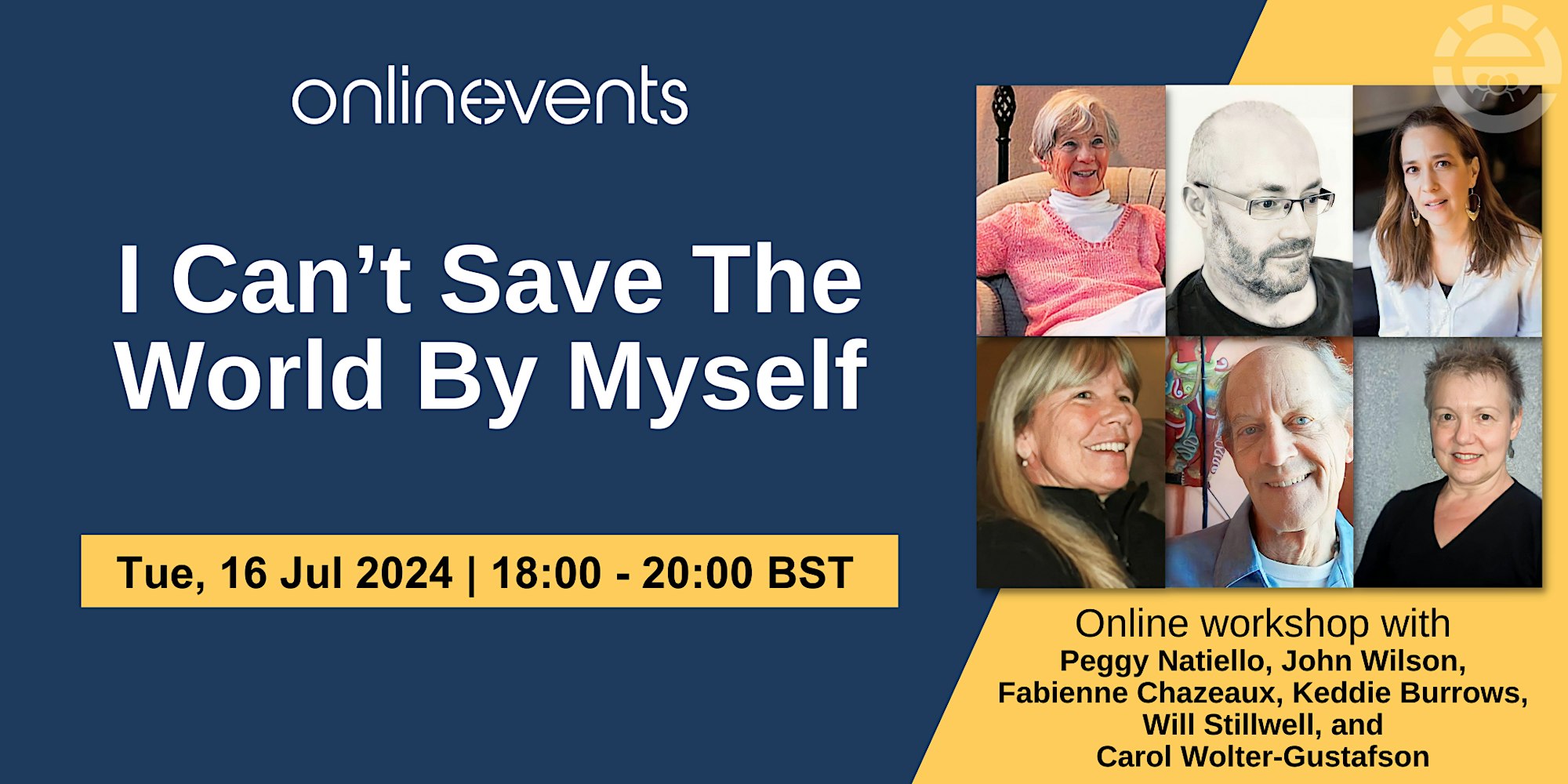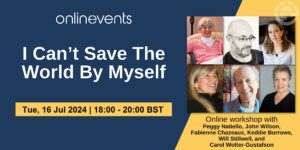About this event
Because
by Rosemerry Wahtola Trommer
So I can’t save the world –
can’t save even myself,
can’t wrap my arms around
every frightened child, can’t foster peace among nations,
can’t bring love to all who
feel unlovable.
So I practice opening my heart
right here in this room and being gentle with my insufficiency. I practice
walking down the street heart first.
And if it is insufficient to share love,
I will practice loving anyway.
I want to converse about the truth,
about trust. I want to invite compassion
into every interaction.
One willing heart can’t stop a war.
One willing heart can’t feed all the hungry.
And sometimes, daunted by a task too big,
I tell myself what’s the use of trying? But today, the invitation is clear:
to be ridiculously courageous in love. To open the heart like a lilac in May,
knowing freeze is possible and opening anyway. To take love seriously, To give love wildly.
To race up to the world as if I were a puppy
adoring and unjaded, stumbling on my own exuberance.
To feel the shock of indifference,
of anger, of cruelty, of fear,
and stay open. To love as if it matters,
as if the world depends on it.
Website | www.wordwoman.com/
Blog | ahundredfallingveils.com/2023/07/21/because-4/
In the poignant and reflective words of Rosemerry Wahtola Trommer’s “Because,” we find a message that resonates deeply with those who aspire to make a difference, however small it may be. If these words move you, if they capture the essence of your own thoughts and struggles, you are warmly invited to our gathering: “I Can’t Save the World By Myself.”
We’re hosting a 2-hour session that will be an unstructured space, allowing for genuine connection and mutual support. Here, every voice matters, every story is honoured, and every heart is welcomed.
In our gathering, we embrace the essence of the poem—opening our hearts, being gentle with our insufficiencies, and practising love in the face of life’s vastness. This group is convened by individuals who are passionate about creating open, inclusive spaces. We are not just organisers; we are participants, eager to connect, share, and grow alongside you.
Join us in this journey of love, courage, and open-heartedness. Let’s create a ripple of compassion and understanding, one conversation at a time. This is more than just a meeting; it’s an opportunity to be ridiculously courageous in love, to stay open despite the challenges, and to embrace the power of connection. Let’s come together, heart first, and make a difference in our own unique way.
We are planning to convene the group regularly. if you cannot make the date on this registration page, please click on the link below for future dates <www.eventbrite.com/cc/i-cant-save-the-world-by-myself-2898189>
Click to view the Start and End Time on your Location | Event Time Announcer – I Can’t Save the World by Myself_07-16
ZOOM
This workshop will be hosted on the Zoom meeting platform where we will use our cameras and microphones to interact with each other as a group.
SELF-SELECT FEE
The self-select fee is a radical inclusion policy to open learning for all colleagues. The guide price for this event is £20.00, however, we appreciate that income varies greatly in different locations and circumstances. Please contribute what you can to help us maintain inclusive professional training.
___________________________
All the colleagues at ONLINEVENTS and the presenters we collaborate with are committed to working in a manner consistent with the BACP Ethical Framework, which can be accessed on the link below. When registering for this event you are agreeing to be present and interact in a manner that is consistent with this Framework.
Facilitation Team
Peggy Natiello

Peggy Natiello’s professional life has focused on Client-centred therapy and the Person-centred approach. Her book, The Person- centred Approach: A Passionate Presence, was written to clarify the importance of Dr. Carl Rogers’s radical beliefs about psychotherapy, education, group work, organizational development, and life. Currently she is reflecting on the perfect fit between those beliefs and the dizzying changes confronting our global culture.
Carol Wolter-Gustafson

As a facilitator, therapist, and university adjunct, the person-centered approach has been her theoretical and experiential home-base since her first group encounter group with Carl Rogers.
Carol has explored human wholeness, brokenness, and our power in our personal and social relationships. Her work is cultivating alternatives to the destructive, “us vs them” zeitgeist in her writing and Going Global Workshops.
Website | carolwolter-gustafson.net
Keddie Burrows

My initial exposure to Carl Rogers and the Person Centered Approach was in 1968. The term at that time was, Client Centered Therapy. I participated in the first La Jolla Program at a University in La Jolla California, where we lived in dorms and stayed for 3 weeks. I was just 16 at the time and had recently been through some traumatic events in my life. My father, Earl Burrows, was a member of the Center for Studies of the Person and worked with Carl, which gave me access to the La Jolla Program and Carl Rogers.
The way I interpreted the “Core Conditions” of the Person-Centered Approach, was maybe different than some, due to my age and my life experience to that point in my personal development. I, unlike most of the other participants, was not involved to become a better therapist or to use these skills for professional purposes. My connection, curiosity, and desire to learn all I could was simply to challenge myself to be the kind of person that I believed in becoming. Subsequently, I have always experienced the “core conditions” as deep personal values to aspire to and not a tool or skill.
The influences of my religious upbringing and my experience at that La Jolla Program, profoundly affected who I have been throughout my life. I have challenged myself to become a person who genuinely did not judge others. For the past 54 years when I do feel judgmental about a person or situation, I begin a process of exploring what is it in me that is causing that feeling. I also remind myself that I have no idea what that person’s life experience has been so, how can I judge them?
Whenever possible, whether in a professional or personal situation, I try to listen to the other person. I “listen” to their words, body language and expressions. I am very fortunate as I am a very curious person. I truly enjoy getting to learn about how other people view the world and their own personal experiences in life. I am fascinated with “listening” to them on many levels, both their verbal and non-verbal communication. I enjoy trying to “hear” the context of what another person is saying to help me understand their experience. This is my way of being empathetic.
I wanted to be congruent, to be able to be honest in expressing myself. For me, congruence means being able to express the feelings I have while not putting them on another person, owning them personally. Voice inflection, body language and words both individually and together can cause a person to feel judged. As a result, I challenged myself to be congruent and pay attention to my reasons for holding back when I noticed I was avoiding being truthful.
I found that unconditional positive regard is the result of working so hard on the values I expressed above. I personally, believe that the “Core Conditions” are meant to be present at the same time. Congruence without Unconditional Positive Regard is something that feels judgmental to me. Unconditional Positive Regard without Congruence feels disingenuous. These assertions are simply my own based on me and my own experience.
I have worked for many years with people who do not either communicate with verbal language or have a different way of communicating. Being person centered, this process of communicating and listening has expanded my senses in finding ways to “hear” the person and return communication. This process has been such a gift in my life as it requires “being person centered” because there is no other way to communicate or model empathy, unconditional regard, congruence, and acceptance of the person.
This information is to give you a little background on who you can expect me to be when I participate in any groups. The skill I bring is simply being me.
Will Stillwell

Will Stillwell, Ph.D., is a long-time member of the professional-personal community, The Center for Studies of the Person, in La Jolla California. There, somewhat retired now from his consulting and academic career, he continues his thirty-seven year association with work at The La Jolla Program. In the Program’s encounter process — originally inspired and supervised by Carl R. Rogers — participants share, risk, and learn to build safe and supportive personal and social enviro0nments together. He is author of a number of articles and books. Through his directorship of the Rogers Memorial Library he has curated and edited a number of video productions concerned with Person-Centered approaches.
Fabienne Chazeaux

Fabienne Chazeaux has been facilitating in Person-centred Psychotherapy training programs in France and in the UK for more than 10 years.
Fabienne is currently working on the Temenos Counselling & Psychotherapy Programme and the ACP France European Certificate in Psychotherapy Programme.
She has a private practice in Paris and online where she offers Psychotherapy for children and adults and supervision to individual Psychotherapy practitioners.
Fabienne is currently offering group supervision for psychologists who specialise in working with children and young people who have been orphaned and psychologists and support workers who specialise in working in an educational setting with children and young people who are living with Autism.
Fabienne is also an experienced business coach and works with senior leaders and leadership teams within global corporations, she also offers individual and group supervision to coaches.
Fabienne is an accomplished artist and has a special interest in how the creative arts can support therapeutic process. Fabienne has developed creative therapeutic tools which she uses with students, supervisees, psychotherapy and coaching clients.
These tools have been developed to be particularly powerful in supporting therapeutic movement where there are no words available, which is often the case for clients who have experienced body and relational trauma or who find themselves paralysed within seemingly intractable organisational settings.
If you have any questions or want to know more about Fabienne ‘s work and sessions : f.********@***il.com
Website | https://www.fabiennechazeaux.com/
John Wilson

I have been facilitating in Counselling & Psychotherapy programmes in the UK for more than 10 years.
I am currently the director at Temenos Education and have a private practice where I offer online Psychotherapy and Supervision using video and chat communication platforms along with virtual environments. I am also the co-founder of onlinevents which has grown to be the world’s largest library of online video and audio content with instant certification and a learning log.
I am also a past chair of the Association for Counselling & Therapy Online (ACTO) and have served for 6 years on the board of the World Association for Person Centered & Experiential Psychotherapy & Counselling. My passion to bring online learning into the field of Counselling & Psychotherapy has also led to the development of online experiential learning within the Temenos programme, facilitating the exposure of Temenos students to external tutors who are located in different parts of the world. Along with the inclusion of experiential learning of online Counselling & Psychotherapy for Temenos students so that they qualify with knowledge and practice in online communication and relationship.
You can read an article I co-authored about online group facilitation here:
https://www.tandfonline.com/eprint/UB2QJDKNCGUMUNUURU8W/full?target=10.1080/14779757.2019.1650807



